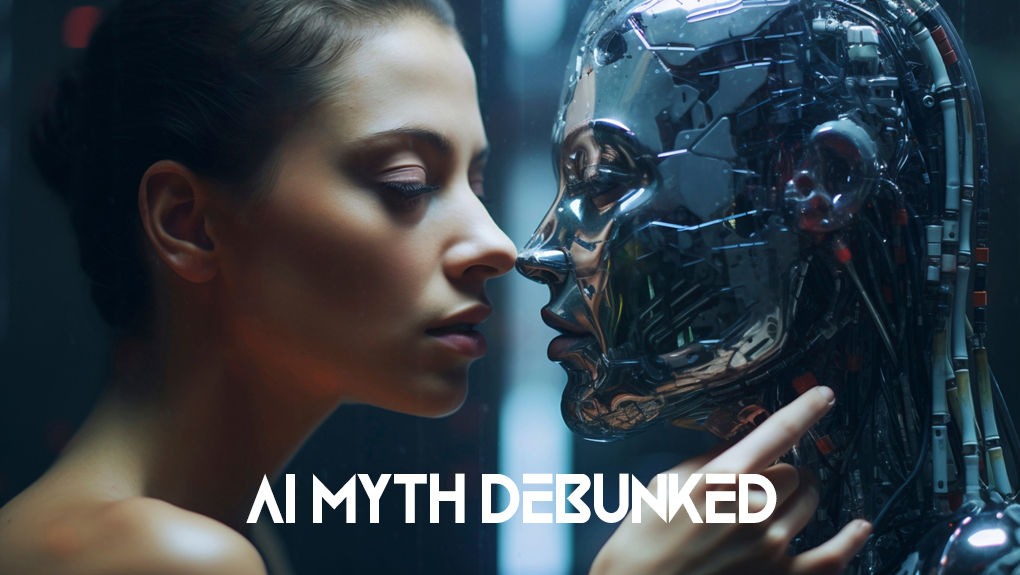|
Getting your Trinity Audio player ready...
|

Artificial Intelligence (AI) has emerged as one of the most transformative technologies of the 21st century, promising to reshape industries, economies, and societies worldwide. However, alongside the excitement and anticipation, there are often misconceptions and myths surrounding AI that can hinder understanding and adoption. In this comprehensive exploration, we’ll debunk some of the most persistent myths about AI and delve into the nuanced realities behind this groundbreaking technology.
Myth 1: AI will replace all human jobs
The fear of widespread unemployment due to automation by AI-driven technologies is a common concern. While it’s true that AI has the potential to automate many routine and repetitive tasks, leading to job displacement in certain sectors, the reality is far more nuanced. Historically, technological advancements, including the advent of computers and automation, have led to shifts in the labor market rather than wholesale job loss.
AI is more likely to augment human capabilities than replace them entirely. By automating mundane tasks, AI frees up human workers to focus on higher-value activities that require creativity, critical thinking, and emotional intelligence—qualities that machines cannot replicate. Moreover, AI creates new job opportunities in emerging fields such as AI development, data science, machine learning engineering, and AI ethics.
However, it’s crucial to address the potential impacts of automation on employment and ensure that workers are equipped with the skills and training needed to adapt to the evolving job market. Governments, businesses, and educational institutions must collaborate to provide reskilling and upskilling programs to empower workers for the jobs of the future.
Myth 2: AI will become sentient and take over the world
The notion of sentient AI rising up against humanity is a recurring theme in science fiction, fueling fears of a dystopian future where machines dominate society. While such scenarios make for compelling storytelling, the reality of AI is far less dramatic.
AI, as we know it today, operates within the confines of its programming and lacks consciousness or self-awareness. Despite remarkable advances in machine learning and neural networks, AI systems remain tools created and controlled by humans. As long as ethical guidelines and regulations are in place to govern the development and deployment of AI technologies, there is no imminent threat of machines surpassing human intelligence and subjugating humanity.
However, it’s essential to remain vigilant about the ethical implications of AI and ensure that its deployment aligns with principles of transparency, accountability, and fairness. Collaborative efforts between policymakers, technologists, ethicists, and civil society are essential to steer AI development in a direction that benefits humanity while mitigating potential risks.
Myth 3: AI is only for big corporations and tech giants
There is a misconception that AI is exclusively the domain of large corporations with substantial resources and expertise. While tech giants like Google, Amazon, and Facebook have made significant investments in AI research and development, the democratization of AI is well underway.
Advancements in cloud computing, open-source software, and AI-as-a-service offerings have made AI more accessible to businesses of all sizes. Small and medium-sized enterprises (SMEs) can leverage cloud-based AI platforms to deploy scalable and cost-effective solutions for tasks such as customer service automation, predictive analytics, and personalized marketing.
Moreover, open-source AI frameworks and libraries, such as TensorFlow, PyTorch, and sci-kit-learn, empower developers to experiment with AI algorithms and build custom solutions tailored to their specific needs. By democratizing access to AI tools and resources, we can foster innovation and drive widespread adoption across diverse industries and sectors.
However, it’s essential to address challenges related to data privacy, security, and regulatory compliance to ensure responsible and ethical use of AI technologies. SMEs may require support and guidance to navigate these complexities and maximize the benefits of AI adoption while minimizing potential risks.
Myth 4: AI is biased and discriminatory
The issue of bias in AI algorithms has garnered increased attention in recent years, raising concerns about the potential for AI systems to perpetuate and amplify existing social biases and discrimination. While AI holds the promise of objectivity and impartiality, the reality is more complicated.
AI algorithms learn patterns and make decisions based on the data they are trained on. If the training data contains biases or reflects systemic inequalities, the resulting AI models may exhibit bias in their predictions and decisions. For example, facial recognition systems trained on predominantly white faces may exhibit higher error rates for people of color, leading to unjust outcomes and reinforcing racial biases.
Addressing bias in AI requires a multi-faceted approach that encompasses data collection, preprocessing, algorithm design, and ongoing monitoring and evaluation. Data scientists and machine learning engineers must be mindful of the potential sources of bias in their datasets and implement strategies to mitigate bias during the model training process.
Moreover, transparency and accountability are crucial for identifying and addressing bias in AI systems. Stakeholders must have access to information about how AI models are trained, tested, and deployed to assess their fairness and equity. Regulatory frameworks and industry standards can also play a role in promoting transparency and ensuring that AI technologies uphold principles of fairness, accountability, and non-discrimination.
Myth 5: AI is too complex and technical for the average person to understand
The perception of AI as an esoteric and inaccessible field reserved for experts with advanced technical knowledge is a barrier to broader participation and engagement. While AI can be complex, its fundamental concepts are within reach for anyone with a basic understanding of technology and a willingness to learn.
There are numerous resources available to demystify AI and make it more approachable to a broader audience. Online courses, tutorials, and educational platforms offer accessible entry points for beginners to learn about AI concepts, algorithms, and applications. Additionally, community-driven initiatives, such as AI meetups, hackathons, and workshops, provide opportunities for hands-on learning and collaboration.
By promoting AI literacy and fostering a culture of inclusivity and diversity in the AI community, we can empower individuals from diverse backgrounds to contribute to and shape the future of AI. Building interdisciplinary teams that encompass a range of perspectives and expertise can lead to more innovative and ethically sound AI solutions that address the needs and values of diverse stakeholders.
To recap, Artificial Intelligence holds immense promise to revolutionize industries, drive innovation, and address complex societal challenges. However, to fully realize its potential, we must confront and dispel the myths and misconceptions that surround AI. By understanding the nuanced realities of AI and embracing its transformative power responsibly, we can harness its capabilities to create a more equitable, inclusive, and sustainable future for all. As we navigate the evolving landscape of AI, let us remain vigilant, ethical, and collaborative in shaping the trajectory of this revolutionary technology for the benefit of humanity.




